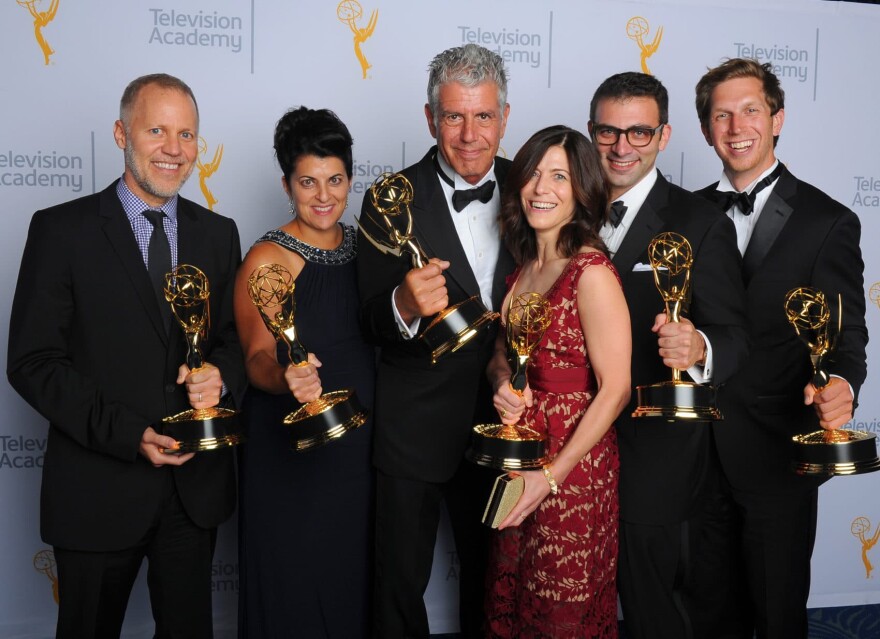Chef-turned-TV star Anthony Bourdain used his CNN documentary series “Parts Unknown” to bring attention not only to food, but also to the social, political and economic challenges that people around the world face.
Bourdain’s death by suicide in June came as a shock to many. He died while on location in France, working on an episode for season 12 of the Emmy- and Peabody Award-winning show.
Here & Now‘s Lisa Mullins talks with longtime “Parts Unknown” executive producer Sandra Zweig, who says she can’t imagine there will be another show like it again.
“Tony had a unique voice. There’s no way to replicate that,” she says.
Interview Highlights
On how the “Parts Unknown” production team has enough content for an entire series
“We had shot the majority of the episodes for the season before he passed away, so there was a large amount of content that was already in the can, as they say. Some of it was in the process of being edited. The first episode, the season premiere, was shot in Kenya with Kamau Bell, and Tony had written and done voiceover for that entire episode, although there were some pickup bits of narration that they wanted to get. That show was pretty much completed.”
On whether Bourdain wrote all his narration
“He did. I mean, the producers and editors would do a scratch version of the VO so that they would have something to work with as they were editing. But he rewrote everything. It was his voice. … I can’t imagine doing the show without his rewrite. If we just handed him a script that he had to read, it wouldn’t have had the same feeling. There were just things that he could add — I mean some of it historical information, quite frankly, that he was like, a wealth of knowledge, and it was part of what made that location interesting or impactful for him.”
On what originally drew Bourdain to CNN from the Travel Channel
“The transition to CNN I think was in part because Tony was interested in doing more than what was on the Travel Channel, [which] was more, you know, travel, food. And Tony really wanted to do more than that. He wanted to go to places that maybe Travel Channel didn’t have the appetite for, or couldn’t help with access to, and the transition to CNN also gave us additional tools and resources and people to talk to about some of those locations that were on Tony’s list, but had just never been possible to do.”
On what people from other countries and cultures made of Bourdain
“I think it depended on maybe where he was going and who he was talking to. Tony had a great skill of kind of being — even though he wasn’t any longer sort of an everyman — but still he was very open to listening to … what was going on in other people’s lives. … He was curious, and he walked into these conversations with a certain amount of information, but the conversation was his. That was one of the interesting things about, if a new producer or director came on, you gave Tony the information and he had the conversation. It wasn’t about kind of feeding him things while you’re shooting.”
On the challenges of finishing the season without Bourdain
“We are so used to his voice, and just being able to fill in the holes, the historical holes, the political holes, to establishing a sense of place, to add humor, to add a point of view — those are all things that Tony did with his narration.
“I can think of a fairly simple, straightforward example: One of the episodes coming up the season is Indonesia, and there’s a complicated political history there that is very hard to get across without someone kind of leading the way and parsing it out. And so we had to find other tools to do that, and then also just some of it just had to fall by the wayside.”
On whether there are moments in the final season that might have been cut had Bourdain been alive, but were kept because of his death
“I know that there are definitely some moments in the shows that might not have been in a show were he still alive, because he made some comments that might have been considered sort of off-camera remarks, or something like that, but it just added more of his voice, which is something that we’re so used to hearing in his narration.
“In the premiere episode in Kenya, there’s a moment where he and W. Kamau Bell are sitting looking out over this kind of vast horizon. Kamau talks about how, looking at where he is now in his life and being there, just kind of seeing how far he’s come, that’s sort of an incredible thing for him. And then Tony talks about what it’s like for him to have this job, and he basically says that, you know, ‘The cameras get turned off and we go out and have a cocktail … I pinch myself.’ … He wouldn’t have wanted that in that show.”
On Bourdain’s death
“I was as stunned probably as anybody else. I never would have imagined it.”
Copyright 2021 NPR. To see more, visit https://www.npr.org.




